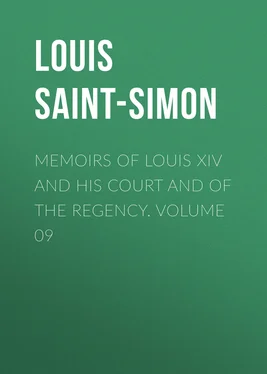Louis Saint-Simon - Memoirs of Louis XIV and His Court and of the Regency. Volume 09
Здесь есть возможность читать онлайн «Louis Saint-Simon - Memoirs of Louis XIV and His Court and of the Regency. Volume 09» — ознакомительный отрывок электронной книги совершенно бесплатно, а после прочтения отрывка купить полную версию. В некоторых случаях можно слушать аудио, скачать через торрент в формате fb2 и присутствует краткое содержание. Жанр: Биографии и Мемуары, История, foreign_edu, foreign_antique, foreign_prose, на английском языке. Описание произведения, (предисловие) а так же отзывы посетителей доступны на портале библиотеки ЛибКат.
- Название:Memoirs of Louis XIV and His Court and of the Regency. Volume 09
- Автор:
- Жанр:
- Год:неизвестен
- ISBN:нет данных
- Рейтинг книги:4 / 5. Голосов: 1
-
Избранное:Добавить в избранное
- Отзывы:
-
Ваша оценка:
- 80
- 1
- 2
- 3
- 4
- 5
Memoirs of Louis XIV and His Court and of the Regency. Volume 09: краткое содержание, описание и аннотация
Предлагаем к чтению аннотацию, описание, краткое содержание или предисловие (зависит от того, что написал сам автор книги «Memoirs of Louis XIV and His Court and of the Regency. Volume 09»). Если вы не нашли необходимую информацию о книге — напишите в комментариях, мы постараемся отыскать её.
Memoirs of Louis XIV and His Court and of the Regency. Volume 09 — читать онлайн ознакомительный отрывок
Ниже представлен текст книги, разбитый по страницам. Система сохранения места последней прочитанной страницы, позволяет с удобством читать онлайн бесплатно книгу «Memoirs of Louis XIV and His Court and of the Regency. Volume 09», без необходимости каждый раз заново искать на чём Вы остановились. Поставьте закладку, и сможете в любой момент перейти на страницу, на которой закончили чтение.
Интервал:
Закладка:
I have so often spoken of Marshal Catinat, of his virtue, wisdom, modesty, and disinterestedness; of the rare superiority of his sentiments, and of his great qualities as captain, that nothing remains for me to say except that he died at this time very advanced in years, at his little house of Saint-Gratien, near Saint-Denis, where he had retired, and which he seldom quitted, although receiving there but few friends. By his simplicity and frugality, his contempt for worldly distinction, and his uniformity of conduct, he recalled the memory of those great men who, after the best-merited triumphs, peacefully returned to the plough, still loving their country and but little offended by the ingratitude of the Rome they had so well served. Catinat placed his philosophy at the service of his piety. He had intelligence, good sense, ripe reflection; and he never forgot his origin; his dress, his equipages, his furniture, all were of the greatest simplicity. His air and his deportment were so also. He was tall, dark, and thin; had an aspect pensive, slow, and somewhat mean; with very fine and expressive eyes. He deplored the signal faults that he saw succeed each other unceasingly; the gradual extinction of all emulation; the luxury, the emptiness, the ignorance, the confusion of ranks; the inquisition in the place of the police: he saw all the signs of destruction, and he used to say it was only a climax of dangerous disorder that could restore order to the realm.
Vendome was one of the few to whom the death of the Dauphin and the Dauphine brought hope and joy. He had deemed himself expatriated for the rest of his life. He saw, now, good chances before him of returning to our Court, and of playing a part there again. He had obtained some honour in Spain; he aimed at others even higher, and hoped to return to France with all the honours of a Prince of the Blood. His idleness, his free living, his debauchery, had prolonged his stay upon the frontier, where he had more facilities for gratifying his tastes than at Madrid. In that city, it is true, he did not much constrain himself, but he was forced to do so to some extent by courtly usages. He was, then, quite at home on the frontier; there was nothing to do; for the Austrians, weakened by the departure of the English, were quite unable to attack; and Vendome, floating upon the delights of his new dignities, thought only of enjoying himself in the midst of profound idleness, under pretext that operations could not at once be commenced.
In order to be more at liberty he separated from the general officers, and established himself with his valets and two or three of his most familiar friends, cherished companions everywhere, at Vignarez, a little isolated hamlet, almost deserted, on the sea-shore and in the kingdom of Valencia. His object was to eat fish there to his heart's content. He carried out that object, and filled himself to repletion for nearly a month. He became unwell—his diet, as may be believed, was enough to cause this—but his illness increased so rapidly, and in so strange a manner, after having for a long time seemed nothing that the few around him suspected poison, and sent on all sides for assistance. But the malady would not wait; it augmented rapidly with strange symptoms. Vendome could not sign a will that was presented to him; nor a letter to the King, its which he asked that his brother might be permitted to return to Court. Everybody near flew from him and abandoned him, so that he remained in the hands of three or four of the meanest valets, whilst the rest robbed him of everything and decamped. He passed thus the last two or three days of his life, without a priest,—no mention even had been made of one,—without other help than that of a single surgeon. The three or four valets who remained near him, seeing him at his last extremity, seized hold of the few things he still possessed, and for want of better plunder, dragged off his bedclothes and the mattress from under him. He piteously cried to them at least not to leave him to die naked upon the bare bed. I know not whether they listened to him.
Thus died on Friday, the 10th of June, 1712, the haughtiest of men; and the happiest, except in the later years of his life. After having been obliged to speak of him so often, I get rid of him now, once and for ever. He was fifty-eight years old; but in spite of the blind and prodigious favour he had enjoyed, that favour had never been able to make ought but a cabal hero out of a captain who was a very bad general, and a man whose vices were the shame of humanity. His death restored life and joy to all Spain.
Aguilar, a friend of the Duc de Noailles, was accused of having poisoned him; but took little pains to defend himself, inasmuch as little pains were taken to substantiate the accusation. The Princesse des Ursins, who had so well profited by his life in order to increase her own greatness, did not profit less by his death. She felt her deliverance from a new Don Juan of Spain who had ceased to be supple in her hands, and who might have revived, in the course of time, all the power and authority he had formerly enjoyed in France. She was not shocked them by the joy which burst out without constraint; nor by the free talk of the Court, the city, the army, of all Spain. But in order to sustain what she had done, and cheaply pay her court to M. du Maine, Madame de Maintenon, and even to the King, she ordered that the corpse of this hideous monster of greatness and of fortune should be carried to the Escurial. This was crowning the glory of M. de Vendome in good earnest; for no private persons are buried in the Escurial, although several are to be found in Saint-Denis. But meanwhile, until I speak of the visit I made to the Escurial—I shall do so if I live long enough to carry these memoirs up to the death of M. d'Orleans,—let me say something of that illustrious sepulchre.
The Pantheon is the place where only the bodies of kings and queens who have had posterity are admitted. In a separate place, near, though not on the same floor, and resembling a library, the bodies of children, and of queens who have had no posterity, are ranged. A third place, a sort of antechamber to the last named, is rightly called "the rotting room;" whilst the other improperly bears the same name. In whilst third room, there is nothing to be seen but four bare walls and a table in the middle. The walls being very thick, openings are made in them in which the bodies are placed. Each body has an opening to itself, which is afterwards walled up, so that nothing is seen. When it is thought that the corpse has been closed up sufficiently long to be free from odour the wall is opened, the body taken out, and put in a coffin which allows a portion of it to be seen towards the feet. This coffin is covered with a rich stuff and carried into an adjoining room.
The body of the Duc de Vendome had been walled up nine years when I entered the Escurial. I was shown the place it occupied, smooth like every part of the four walls and without mark. I gently asked the monks who did me the honours of the place, when the body would be removed to the other chamber. They would not satisfy my curiosity, showed some indignation, and plainly intimated that this removal was not dreamt of, and that as M. de Vendome had been so carefully walled up he might remain so!
Harlay, formerly chief-president, of whom I have so often had occasion to speak, died a short time after M. de Vendome. I have already made him known. I will simply add an account of the humiliation to which this haughty cynic was reduced. He hired a house in the Rue de l'Universite with a partition wall between his garden and that of the Jacobins of the Faubourg Saint-Germain. The house did not belong to the Jacobins, like the houses of the Rue Saint-Dominique, and the Rue du Bac, which, in order that they might command higher rents, were put in connection with the convent garden. These mendicant Jacobins thus derive fifty thousand livres a-year. Harlay, accustomed to exercise authority, asked them for a door into their garden. He was refused. He insisted, had them spoken to, and succeeded no better. Nevertheless the Jacobins comprehended that although this magistrate, recently so powerful, was now nothing by himself, he had a son and a cousin, Councillors of State, whom they might some day have to do with, and who for pride's sake might make themselves very disagreeable. The argument of interest is the best of all with monks. The Jacobins changed their mind. The Prior, accompanied by some of the notabilities of the convent, went to Harlay with excuses, and said he was at liberty, if he liked, to make the door. Harlay, true to his character, looked at them askance, and replied, that he had changed his mind and would do without it. The monks, much troubled by his refusal, insisted; he interrupted them and said, "Look you, my fathers, I am grandson of Achille du Harlay, Chief-President of the Parliament, who so well served the State and the Kingdom, and who for his support of the public cause was dragged to the Bastille, where he expected to be hanged by those rascally Leaguers; it would ill become me, therefore, to enter the house, or pray to God there, of folks of the same stamp as that Jacques Clement." And he immediately turned his back upon them, leaving them confounded. This was his last act of vigour. He took it into his head afterwards to go out visiting a good deal, and as he preserved all his old unpleasant manners, he afflicted all he visited; he went even to persons who had often cooled their heels in his antechambers. By degrees, slight but frequent attacks of apoplexy troubled his speech, so that people had great difficulty in understanding him, and he in speaking. In this state he did not cease his visits and could not perceive that many doors were closed to him. He died in this misery, and this neglect, to the great relief of the few who by relationship were obliged to see him, above all of his son and his domestic.
Читать дальшеИнтервал:
Закладка:
Похожие книги на «Memoirs of Louis XIV and His Court and of the Regency. Volume 09»
Представляем Вашему вниманию похожие книги на «Memoirs of Louis XIV and His Court and of the Regency. Volume 09» списком для выбора. Мы отобрали схожую по названию и смыслу литературу в надежде предоставить читателям больше вариантов отыскать новые, интересные, ещё непрочитанные произведения.
Обсуждение, отзывы о книге «Memoirs of Louis XIV and His Court and of the Regency. Volume 09» и просто собственные мнения читателей. Оставьте ваши комментарии, напишите, что Вы думаете о произведении, его смысле или главных героях. Укажите что конкретно понравилось, а что нет, и почему Вы так считаете.












